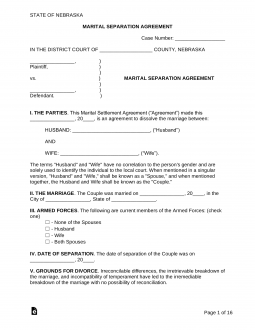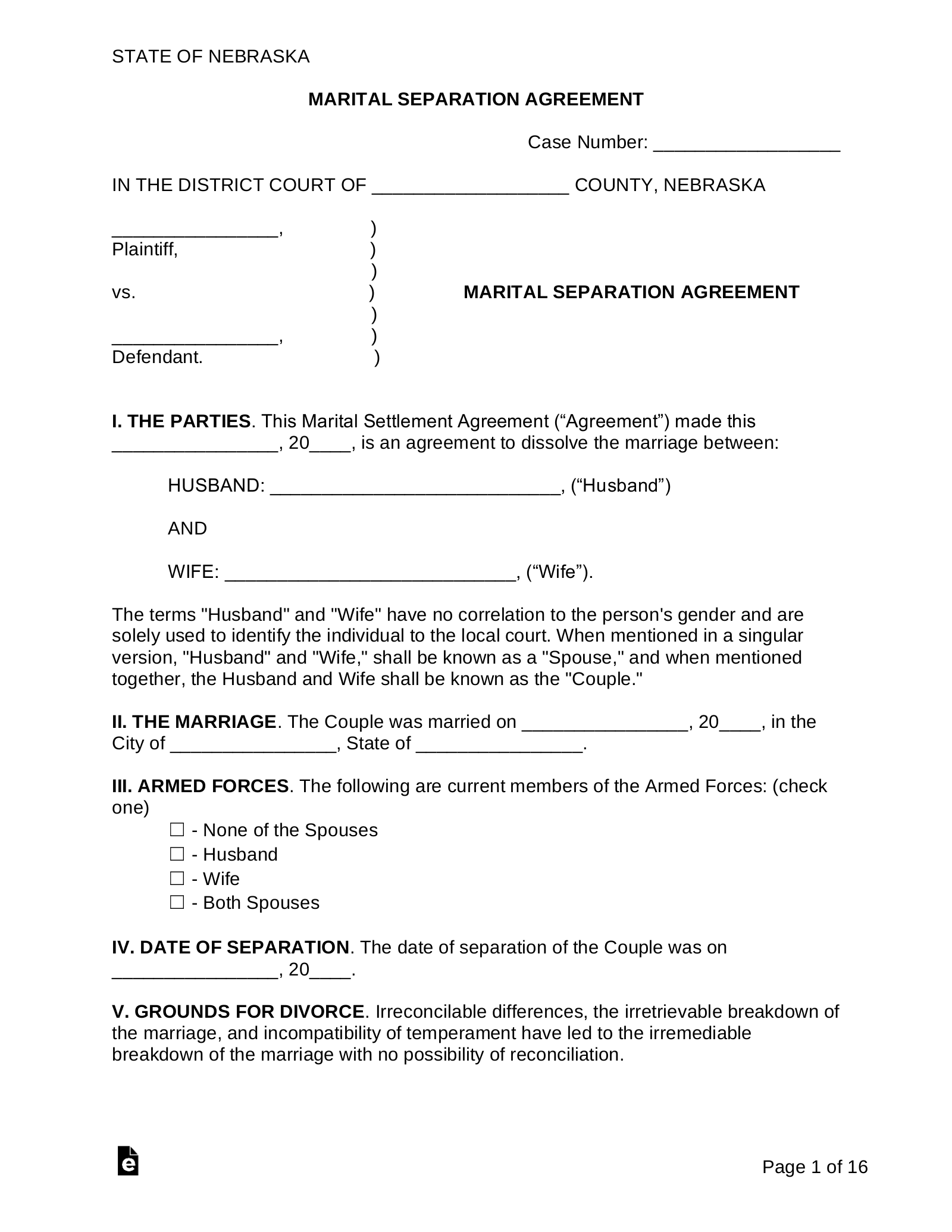Updated September 01, 2023
A Nebraska marital settlement agreement is a legally binding arrangement between a married couple that states the terms of their divorce. By signing an agreement before their divorce is finalized, the spouses are able to determine the division of their property and assets rather than have such decisions left to the court. If a couple has children, they can include provisions for child custody, parenting time, visitation, and child support in their contract. Any terms of their separation that the couple doesn’t formally agree upon may be determined by the judge at their final hearing.
Table of Contents |
Divorce Laws
Statutes:
- Nebraska Revised Statutes – Chapter 42 (§ 42-341 to § 42-823)
- Supreme Court Rules – Chapter 4, Article 2 (Child Support Guidelines)
Alimony (§ 42-365) – The spouse with child custody in a divorce case may be awarded alimony paid by the other party in an amount and manner determined by the court.
- Alimony Calculator – calculators.law
Child Support (§ 42-364) – In a divorce where the couple has minor children together, either spouse can be awarded child support from the other party in accordance with Nebraska’s Child Support Guidelines.
- Child Support Calculator – Nebraska State Bar Association
Division of Property (§ 42-365) – Under state law, the property of divorcing couples will be reasonably divided between them by the court in consideration of the financial circumstances of each spouse, the duration of the marriage, and their contributions to the marriage, child care, and property. This type of division is known as equitable distribution because property is divided relative to each spouse’s circumstances as opposed to equally (fifty-fifty).
Grounds for Divorce (§ 42-361) – Nebraska is a “no-fault” state, which means that the only required grounds for divorce is for a spouse to declare that their marriage is irretrievably broken.
Interim Support (§ 42-367) – The court may require a husband to pay the wife a temporary allowance while their divorce case is pending.
Residency (§ 42-349) – To be eligible to file for divorce in Nebraska, at least one (1) spouse must have been a state resident for one (1) year before their case is filed.
Divorce Forms
- Where to File – District Court in County of Residence
- Filing Fee – $158
- How Long Does it Take? At least sixty (60) days
Uncontested Divorce with No Children:
- Complaint for Dissolution of Marriage Without Children (DC 6:4.1)
- Confidential Employment and Health Insurance Information (DC 6:5.11)
- Social Security, Gender, Birth Date(s) (DC 6:5.12)
- Voluntary Appearance (DC 6:4.3)
- Praecipe for Summons (DC 6:4.4)
- Summons (drafted by clerk of the court’s office)
- Return of Service (executed by the county sheriff’s office)
- Notice of Hearing (DC 6:4.5)
- Marital Settlement Agreement
- Decree of Dissolution of Marriage – No Children (DC 6:4.6)
- Affidavit and Application to Proceed In Forma Pauperis (DC 6:7.1)
- Vital Statistics Certificate (Bureau of Vital Statistics Worksheet)
- Answer and Counterclaim for Dissolution of Marriage (No Children) (DC 9:1)
Uncontested Divorce With Children:
- Complaint for Dissolution of Marriage With Children (DC 6:5.1)
- Confidential Employment and Health Insurance Information (DC 6:5.11)
- Social Security, Gender, Birth Date(s) (DC 6:5.12)
- Voluntary Appearance (DC 6:4.3)
- Praecipe for Summons (DC 6:4.4)
- Summons (drafted by clerk of the court’s office)
- Return of Service (executed by the county sheriff’s office)
- Certificate of Completion of Parenting Education Course (DC 6:5.5)
- Financial Affidavit for Child Support (DC 6:5.2)
- Notice of Hearing (DC 6:4.5)
- Marital Settlement Agreement
- Decree of Dissolution of Marriage – With Children (DC 6:5.3)
- Parenting Plan Parent-Created (Joint Legal and Joint Physical Custody) (DC 6:5.37)
- Parenting Plan Parent-Created (Joint Legal and Sole Physical Custody) (DC 6:5.38)
- Parenting Plan Parent-Created (Sole Legal and Sole Physical Custody with One Parent) (DC 6:5.39)
- Affidavit and Application to Proceed In Forma Pauperis (DC 6:7.1)
- Vital Statistics Certificate (Bureau of Vital Statistics Worksheet)
- Answer and Counterclaim for Dissolution of Marriage (With Children) (DC 10:1)
How to File for Divorce in Nebraska (10 steps)
- Complete Divorce Paperwork
- File Divorce Paperwork with District Court
- Serve Defendant
- Defendant’s Response
- Parenting Education Course and Parenting Plan
- Marital Settlement Agreement
- Financial Affidavit for Child Support
- Notice of Hearing
- Decree of Dissolution of Marriage and Final Hearing
- Name Change
1. Complete Divorce Paperwork
To file for divorce in Nebraska, one (1) spouse (the “plaintiff”) will need to complete a Complaint for Dissolution of Marriage form (Without Children / With Children) that declares that their marriage is irretrievably broken and names their spouse as the defendant. Along with the complaint, the plaintiff will also need to fill out the following forms to begin their case:
- Confidential Employment and Health Insurance Information (Without Children / With Children)
- Social Security, Gender, Birth Date(s) – Couples with children only
- Vital Statistics Certificate
2. File Divorce Paperwork with District Court

The completed paperwork must be filed with the Clerk of the District Court for the county in which the plaintiff or their spouse is a resident. The cost to file a Complaint for Dissolution of Marriage is $158. The plaintiff will be required to pay the filing fee to have their case filed unless they cannot afford to and file an Affidavit and Application to Proceed In Forma Pauperis to request that the fee be waived.
3. Serve Defendant
The defendant must be given notice of the divorce case and acknowledge said notice by completing a Voluntary Appearance and filing it with the clerk of the court where the case was filed. Alternatively, the plaintiff can have the defendant served by a sheriff by filing a Praecipe for Summons and a money order made out to the county sheriff’s office with the clerk of the district court (the service fee will need to be verified by contacting the office in advance). The clerk’s office will draft a Summons form and send copies of the money order and copies of the summons and complaint to the sheriff’s office for service on the defendant. After delivering the summons and complaint, the sheriff will complete a Return of Service as proof that the documents were served, and file it with the court.
4. Defendant’s Response
The defendant will have to file an Answer and Counterclaim for Dissolution of Marriage (Without Children / With Children) within thirty (30) days of receiving a summons or filing a Voluntary Appearance. This document may be used whether or not the defendant contests the complaint; however, its inclusion in a divorce case is not mandatory (for instance, if the divorce is uncontested).
5. Parenting Education Course and Parenting Plan

If the couple has any minor children together, they will need to attend a parenting class before their divorce hearing to help them establish a Parenting Plan, a document which must be brought to their final hearing. The couple may draft their own parenting plan or use the Parenting Plan for Joint Legal and Joint Physical Custody, Joint Legal and Sole Physical Custody, or Sole Legal and Sole Physical Custody with One (1) Parent form. After completing the required training, each spouse must complete a Certificate of Completion of Parenting Education Course and file it with the clerk of court.
6. Marital Settlement Agreement
In an uncontested divorce, the couple will usually draft a Marital Settlement Agreement to determine how their property and assets will be divided. This document can be completed and attached to the divorce decree before it is presented to the judge at their final hearing.
7. Financial Affidavit for Child Support
If there is to be a determination of child support in the case, both spouses must disclose certain financial information by completing a Financial Affidavit for Child Support and filing it with the court clerk’s office.
8. Notice of Hearing

The date for a final divorce hearing will be set a minimum of sixty (60) days from the date that the defendant was given notice. The procedure for appointing a hearing date varies from one county to another, and the plaintiff may need to formally request a hearing; therefore, individuals must consult with their local court’s office for details. Once the plaintiff has received a date for their final hearing, they will need to fill out the first page of the Notice of Hearing and deliver a copy of the document to their spouse. On the original notice, the plaintiff will need to complete and sign the Certificate of Service portion and file it with the clerk of the court.
9. Decree of Dissolution of Marriage and Final Hearing
Prior to attending their divorce hearing, the plaintiff must fill out the Decree of Dissolution of Marriage (Without Children / With Children), leaving the date and signature fields at the bottom blank to be completed by the judge. If the divorce is uncontested, the defendant isn’t required to attend the final hearing; however, the plaintiff must arrive on time or their case may be dismissed. At the hearing, the plaintiff will give the Decree of Dissolution and, if applicable, marital settlement agreement and parenting plan to the judge or clerk of the court. If the judge approves the proposed terms of the divorce, they will sign the decree and file it with the court clerk’s office. The divorce will be final thirty (30) days from the date that the decree was filed.
10. Name Change
Under state law, either spouse may have their former name legally restored as a part of their divorce case by including such a request in the original complaint and proving their formal name. Once the divorce is finalized, the name change will be reflected in the divorce decree. Certified copies of the decree can be used as proof of name restoration when updating identification and personal accounts.


